- Interesting for you
- My settings
The PhD program in Statistics at the Research School of Finance, Actuarial Studies and Statistics (RSFAS) at Australian National University equips graduates with knowledge of developments in theoretical and applied statistics.
Australian National University Multiple locations Canberra , Australian Capital Territory , Australia Top 0.5% worldwide Studyportals University Meta Ranking 3.7 Read 66 reviews
The PhD program draws upon the diverse expertise of academic staff across the University. The School’s PhD candidates will undertake independent research on a specialised research topic.

Features
- The Statistics program at Australian National University is focused on developing candidates for a career in academia, government or industry.
- Positions in government or industry may include researchers in scientific, medical or health research organisations; researchers or analysts within government agencies, such as the Australian Bureau of Statistics and Australian Institute of Health and Welfare, or departments of Health, Agriculture, Education, Finance and Treasury; researchers or quantitative data analysts within the corporate sector, including banking, finance and insurance, pharmaceutical, and energy and mining sectors; and management and statistical consultants.
Programme Structure
Courses include:
- Statistical Inference
- Advanced Mathematical Statistics
- Statistical Learning
- Stochastic Modelling
Key information
- 24 months
2 - 4 years
4 - 8 years
Start dates & application deadlines
- Starting 2024-07-22 00:00:00 Application deadline not specified.
- Apply before 2024-10-31 00:00:00
Pass IELTS with Swoosh English! Sign up for a free writing masterclass or claim your exclusive 25% Studyportals discount and accelerate your preparation by taking a course designed by experts to get you the results you need.
Disciplines
Academic requirements, english requirements, student insurance.
Make sure to cover your health, travel, and stay while studying abroad. Even global coverages can miss important items, so make sure your student insurance ticks all the following:
- Additional medical costs (i.e. dental)
- Repatriation, if something happens to you or your family
- Home contents and baggage
We partnered with Aon to provide you with the best affordable student insurance, for a carefree experience away from home.
Starting from €0.53/day, free cancellation any time.
Remember, countries and universities may have specific insurance requirements. To learn more about how student insurance work at Australian National University and/or in Australia, please visit Student Insurance Portal .
Other requirements
General requirements.
- an Australian Bachelor degree (or equivalent) with First Class Honours or Second Class Honours Division A in statistics (or a related discipline), or
- another qualification (e.g. a Master degree) with a substantial research thesis component that the RSFAS HDR (higher degree by research) committee is satisfied is equivalent or superior to a degree mentioned in (a), or
- a combination of qualifications and professional experience that the RSFAS HDR committee is satisfied is equivalent or superior to a degree mentioned in (a).
- CRICOS: 048345A
Tuition Fee
International, living costs for canberra.
The living costs include the total expenses per month, covering accommodation, public transportation, utilities (electricity, internet), books and groceries.
In order for us to give you accurate scholarship information, we ask that you please confirm a few details and create an account with us.
Scholarships Information
Below you will find PhD's scholarship opportunities for Statistics.
Available Scholarships
You are eligible to apply for these scholarships but a selection process will still be applied by the provider.
Read more about eligibility
- missing or incomplete ?"> Missing or incomplete content
- wrong or outdated ?"> Wrong or outdated content
Other interesting programmes for you
Our partners.
Go to your profile page to get personalised recommendations!
School of Demography

Related Sites
- ANU College of Arts and Social Sciences
- Research School of Social Sciences
- Australian National Internships Program
You are here
PhD and MPhil

The School of Demography is interested in receiving prospective applications from candidates who will like to study for a PhD in Demography .
As Australia’s national university, the ANU is home to the many of the country’s leaders in demography and population studies. Our researchers examine and study the most pertinent issues facing the world today . Research expertise in the School covers all the major areas of demography, including Asian Demography ; Fertility, Family Formation and Change ; Mortality, Ageing and Health ; and Migration . A PhD in Demography at the ANU offers postgraduate research training which brings together this expertise to inform a new generation of researchers, policy makers and business leaders.
This research degree enable students to undertake an in-depth research project at postgraduate level under the close supervision of academic experts. Through its supportive environment and programs the School encourages new modes of research while it also supports traditional scholarly methods of inquiry. This program, based on clear requirements and transparent principles, is designed to maximise the quality and impact of student research.
For an overview of the application process, please see PhD and MPhil applications in the Arts, Humanities and Social Sciences
How to apply
Prospective PhD candidates please follow these 4 steps.
Step 1: Check your eligibility
To be admitted to the Doctor of Philosophy, Demography PhD program you are required:
- To have achieved a Master degree or an equivalent postgraduate qualification in demography (or related field: such as geography, mathematics, quantitative sociology, statistics, public health or economics) from an approved university, with results that the convenor deems to be at least equivalent to Australian academic standards.
- To meet the University’s English Language Admission Requirements for Students .
Inquiries regarding the admission requirements may be addressed to the School of Demography Convenor ( [email protected] ).
Step 2: Look for a possible supervisor and submit an expression of interest
Please look through the School of Demography’s academics list to search for academics who have the appropriate expertise and research interests to provide advice and supervision on your proposed research activities, and make contact with them via email (with copy to the Convenor, [email protected] ).
Email the following documents to the potential supervisors:
- Curriculum vitae (CV)
- Academic transcripts
- IELTS/TOEFL results (if applicable)
- A brief description of your proposed research (less than one page)
Your potential supervisors might arrange an interview with you either in person or by zoom.
At ANU, higher degree research students have a primary supervisor, Chair of panel and a panel of associate supervisors (advisors). In most cases, the primary supervisor and chair of supervisory panel fulfil the same role.
Step 3: Write a thesis proposal
After the selected supervisor agrees to work with you, then you can work on a Thesis proposal (7–8 pages) including the following elements:
- Title: Give a precise and informative description of the project.
- Abstract: A summary of the proposed research that includes the key research question or hypothesis, the rationale for the research, the region under study, and the method to be employed in the research.
- Aims & significance: A clearly focused statement of the overall purpose of the proposed research (i.e. why is it important?).
- Research questions &/or hypotheses : The questions that the proposed research will address and/or the hypotheses that will be tested.
- Literature review: You need to demonstrate that you are aware of the wider literature published on the topic, both in national and international journals, and showing how your research can engage with the on-going debates. Therefore, you need to provide a preliminary review of the key research that has already been carried out in the field and identification of the gaps in the literature that the proposed research aims to fill.
- Data and Methods: It is crucially important for a proposal to spell out at least initial ideas for the data and methodology to be used during the PhD. Give an explanation of what type of data will be required, and how the data will be gathered and analysed. Similarly, you should discuss how the proposed methods are appropriate for the proposed project, and indicate the likely feasibility of the proposed approach.
- Timetable: An indication of how the research will be carried out over the duration of a full-time (3.5 years of PhD) candidature.
- Institutional fit: A statement on why the ANU School of Demography is suitable for your project and an indication of potential supervisors.
- Bibliography: A list of references cited in or relevant to the proposal.
Step 4: Make a formal application to ANU
Please note:
- A minimum of 3 letters of reference are required (at least 2 must be academic references)
- You must have a confirmed supervisor willing to be your panel chair.
Once your selected supervisor has interviewed you and signed off on your proposal, you may then submit an online application to ANU: see www.anu.edu.au/study/apply/anu-postgraduate-research-domestic-and-international-applications
>> Programs and Courses: Doctor of Philosophy, Research School of Social Sciences
ANU International Scholarships
Admission and ANU administered scholarships for HDR degrees are applied for together with the PhD application for admission (an online form). If you are interested in being considered for an ANU administered scholarship you should indicate this in the relevant sections of the application.
The Scholarship ranking process is very rigorous, each applicant must first be internally ranked and recommended by their School or Centre for the Scholarship round. Then a central College HDR Scholarship round committee assesses and ranks each applicant. Many criteria are taken into account, such as:
- Academic record (including GPA)
- Support from prospective supervisor and area
- Research Proposal
- Referee reports & questionnaires
- Publications
- Prizes, Awards and Scholarships
- Relevant professional experience
- English language competency
- Ranking relevant to others in the graduate research field or discipline area
Following this there is often a University level ranking committee that ranks applicants put forward by the College to reach a final ranked list of applicants.
HDR Convenor Dr Bernard Baffour E: [email protected] T: +61 2 6125 9030
HDR Administrator E: [email protected]
File attachments
- SoD_HDR_Support_Guidelines_May_2019.pdf ( PDF , 174.88 KB )
Tweets by DemographyANU
There were no tweets found.
Connect with us

Updated: 10 July 2023 / Responsible Officer: Head of School / Page Contact: CASS Marketing & Communications
- Contact ANU
- Freedom of Information
+61 2 6125 5111 The Australian National University, Canberra TEQSA Provider ID: PRV12002 (Australian University) CRICOS Provider : 00120C ABN : 52 234 063 906


Mathematical Sciences Institute ANU College of Science

PhD & MPhil
Join our community of over 200 members, PhD students and associates, conducting internationally recognised mathematical sciences research.

- Doctor of Philosophy
Are you considering undertaking a PhD in the Mathematical Sciences? We have many interesting projects for talented postgraduate researchers. This page provides useful information and links discover more about our PhD Program and the application process.

Master of Philosophy
The Master of Philosophy in Mathematical Sciences is a higher degree by research, and may be taken as a full-time course (one to two years) or as a part-time course (two to four years).
More information
Find a supervisor ».
Find a MSI supervisor for your research degree.
Summer research »
A Summer Research Scholarship at ANU is an exceptional opportunity for undergraduate students, providing insight into what studying for an Honours or a graduate research degree is all about.
MSI 'Kick-start' Postdoctoral Fellowship »
Read more about this short-term employment opportunity for high achieving early career mathematicians.
Research areas
- Algebra & topology
- Analysis & geometry
- Applied & nonlinear analysis
- Bioinformation science
- Computational mathematics
- Fusion plasma theory and modelling
- Mathematical physics
- Stochastic analysis & risk modelling
- Theoretical astrophysics
Prerequisites
Applicants should be of a high scholastic calibre and should have a capacity for research.
Applicants for research degree scholarships must hold a bachelor degree with at least upper second class Honours, although competition is such that applicants usually have to hold a first class Honours degree to be competitive (and for some scholarships, this is mandatory), or a Master by coursework or a Graduate Diploma (which must be completed at a level equivalent to first or upper second-class Honours) degree from a recognised University. In special cases, applicants with other qualifications and/or research experience may be considered.
English language requirements
You are required to meet our English Language Requirements before you can be accepted for admission. Unless your previous tertiary-level studies were undertaken in English in (for example) Australia, Canada, New Zealand, the United Kingdom or the United States of America, you will normally have to sit for either the International English Language Testing System (IELTS - overall 6.5 with no band less than 6.0) or the Test of English as a Foreign Language (TOEFL - 570 with TWE 4.5). Some programs may require higher scores.
If you have any questions about your application for admission and where it is up to, you can contact ANU Admissions Office .
Research program applications are accepted at any time of the year, however there may be deadlines associated with scholarships that should be considered. For this reason, applicants are strongly recommended to apply for both admission and scholarship, before the following deadlines:
- Overseas students: by the 31st of August to be admitted in the following year.
- Australia and New Zealand students: by the 31st of October to be admitted in the following year.
See here for more information on how to apply:
- Domestic applicants
- International applicants
How long does it take?
A PhD program takes at least 2 years and at most 4 years to complete full time. All ANU scholarships end after 3.5 years without any substitute at the RSC.
What scholarships are available?
ANU offers a variety of scholarships to eligible students studying a research degree program. Scholarships are provided to assist students with the cost of their studies.
Domestic students are enrolled into research programs under the Australian Government Research Training Program (AGRTP) Fee Offset Scholarship . Under the AGRTP, the Australian Government pays 100% of domestic research students' tuition fees.
Scholarships differ in value and may be offered to cover some or all of the costs associated with tuition, accommodation, materials, relocation, cost of living and other expenses.
The Conditions of Award for each scholarship stipulates what the scholarship may be used for.
Two of the most sought after scholarships available are the Australian Government Research Training Program (AGRTP) Stipend Scholarship for domestic research students, and the Australian Government Research Training Program (AGRTP) International Fee Offset Scholarship for international research students.
Different scholarships are available depending on whether you are a domestic or international student.
Scholarships available to domestic research students
- AGRTP Stipend Scholarship , applications close 31 October each year
- ANU University Research Scholarship , applications close 31 October each year
- ANU PhD Scholarships , applications can be made throughout the year
The Mathematical Sciences Institute also offers supplementary scholarships to attract talented Australian and New Zealand students of high calibre to pursue postgraduate research within the MSI. The scholarship provides for payment of a supplementary stipend to an outstanding holder of an AGRTP or similar stipend scholarship for the duration of that scholarship. The value of this scholarship is $5,000 per annum.
The maximum duration of this scholarship is three years full-time, with a possible six month extension.
Eligibility: Candidates who have completed a four year undergraduate degree or equivalent at H1 level and who wish to undertake a PhD at the School, are eligible. Domestic students include Australian citizens, Australian permanent residents, and New Zealand citizens.
It is not necessary to complete a separate application form as all eligible candidates will be considered.
Scholarships available to international research students
- AGRTP International Fee Offset Scholarship - covers tuition fees for 3 years and provides Overseas Student Health Cover
- ANU Tuition Scholarships
- ANU PhD scholarships
International applicants are also encouraged to explore the Endeavour Awards offered by the Australian Government. Closing date for applications is usually 30 June each year.
How do I apply?
You need to apply online – one application covers both admission and scholarships. You will be automatically considered for all scholarships available to you. For more information please see the Apply tab.
Do I have to pay tuition fees?
Yes, unless you are a citizen or permanent resident of Australia or a citizen of New Zealand. International students can be considered for a HDR Fee Remission Merit Scholarship – where Tuition fees will be waived. This will be considered automatically and does not require additional paperwork.
How do I apply for a visa?
Prospective international students need to provide: (i) CV, (ii) academic transcript (colour scans), (iii) TOEFL or IELTS scores, (iv) 3 references of academics, (v) research proposal / project description by ANU supervisor. Once your application has been accepted you will receive a letter of offer for admission – once all conditions have been met (e.g. proof of health cover) and you have signed the paperwork, the ANU will provide an electronic certificate of enrolment (eCOE). You need the eCOE to apply to the Department of Immigration for a student visa.
Do I need Health Cover and how much does it cost?
Yes, International Students need to pay Overseas Student Health Cover (OSHC) in advance for 52 months as part of the visa requirements. You can either arrange your own OSHC, or ask the ANU to arrange it for you. Details will be outlined in your letter of offer for admission. The cost of OSHC for 2017 from the ANU preferred provider (Allianz) is $3,240 for single cover.
Where will I live?
The cost of living in any city obviously depends on needs, lifestyle choices and spending habits. For accommodation on-campus please refer to the following website: http://www.anu.edu.au/study/accommodation .
More questions?
For any questions about undertaking a PhD within the Mathematical Sciences Institute, applying for admission and/or scholarships, or general questions about Canberra – please contact our friendly MSI HDR Student Administrator at [email protected] .
- Honours in Mathematics general information
- Honours in Mathematics
- Master degrees
- MSI 'Kick-start' Postdoctoral Fellowship
- First year streams
- MATH 3349, MATH 4349, MATH 6209 - Special Topics in Mathematics
- Majors, minors & specialisations
- Previous reading courses & special topics courses
- Choosing a first-year maths course
- Bridging course
- Student projects
- Student profiles
- ANU Extension
- Summer research program
- Scholarships & prizes
- ANU-ITER Research Training Scheme
- Research stories
- CMA proceedings
- MDSC: Mathematical Data Science Centre
- Professional staff
- Event series
- Weekly bulletin - next week
- Special years
- Friends & alumni program
- Secondary schools program
- General information for visitors
- The International Associated Laboratory (LIA) 'Fundamental Mathematics' (FuMa) - National Center for Scientific Research (CNRS)
- The Mathematical Sciences Research Visitor Program (MSRVP)
- Equity & diversity
- Work Health and Safety (WHS)
- Future students enquiries
- Current students enquiries
- General enquiries
- Becoming a demonstrator
- MSI intranet
- Statistical Consulting Unit
- MSI book collection
- Student support

Finance PhD placements
Bardia khorsand .
University of College Dublin, 2020
Diego Puente Moncayo
University of Technology Sydney, 2020
Yizhi (Jeremy) Wang
Shandong University of Science and Technology, 2020
Isaac Pan
University of Sydney, Lecturer in Finance, 2019
Philip Drummond
Monash University, Lecturer in Finance, 2018
Pin-te Lin
Henley Business School, University of Reading, 2018
Sarah Osborne
Queensland University of Technology, 2017
Graduate research programs
The ANU College of Business and Economics (CBE) conducts world-class research. The College’s academic staff collaborate on research projects with other academic institutions, industry and government. They are at the forefront of global thinking on issues relating to wealth and wellbeing, strong organisations, transformative innovation, and the foundations of academic theory in all of the areas CBE researches.
CBE’s higher degree by research (HDR) programs include the Doctor of Philosophy (PhD) and the Master of Philosophy (MPhil). The College’s HDR candidates develop strong research skills during their candidacy, and undertake independent research in their chosen field(s) of study under the guidance of some of the world’s brightest minds. Candidates are also immersed in a vibrant and supportive academic community and have access to the University’s well-developed HDR support services .
CBE’s HDR candidates benefit from the highest quality education, reflected in their impressive post-graduation professional achievements. Many of our alumni are leaders in academia, public administration and business.

Doctor of Philosophy (PhD)
PhD candidates undertake quality and impactful research under the supervision of internationally renowned subject matter experts.

Master of Philosophy (MPhil)
MPhil candidates conduct research under the direction of world-leading scholars that can pave the way to subsequent doctoral studies.

Scholarships and fees
CBE offers a range of generous scholarships and stipends to HDR candidates.

Academic and career supports
The College provides a range of well-developed resources to support HDR candidates’ academic, professional and career development.

Job placement
CBE’s HDR graduates have excelled at leading academic institutions, government organisations and industry enterprises around the globe.

PhD Stipends in infectious disease modelling and applied statistics

- Share this on

- Send this by

About this scholarship
We are seeking domestic PhD applicants with advanced skills in mathematical statistics, infectious disease modelling, or spatial modelling to contribute to an ARC Linkage funded project “Surveillance programs and sampling schemes for assessing and maintaining the absence of pests and diseases”.
We intend to fund two PhD projects in the following areas:
- Mathematical modelling of diseases at low prevalence, including designing surveillance to detect emerging pests or diseases, with applications including Cucumber Mosaic Virus, Lymphatic Filariasis and African Swine Fever.
- Spatial modelling of spread of pathogens and pests, including the role of climate variability in driving incursion, with applications including viruses such as Bluetongue virus that are spread by biting midges.
The successful candidates will work closely with ANU staff from the National Centre for Epidemiology and Population Health (NCEPH), the Research School of Finance, Actuarial Studies and Statistics (RSFAS), and in collaboration with staff from the Commonwealth Department of Agriculture, Fisheries and Forestry. Students will be located in NCEPH for their PhD.
SCHOLARSHIP TYPE
Payments made fortnightly
Payments made for 3.5 years
APPLICATION PERIOD
01-Oct-2023 to 19-Jan-2024
Student types
Student levels
Number of scholarships awarded
Selection bases
Ongoing eligibility
Field of study
Eligibility.
The scholarships will be awarded to prospective domestic graduate students who:
- have applied for admission to a PhD in the National Centre for Epidemiology and Population Health.
- have a Bachelor degree with first-class honours or a Master degree with a research component or equivalent from a recognised university.
- have the skills in mathematical statistics, infectious disease modelling, or spatial modelling required to complete these PhD project.
Additional information
How to apply, reference documents, further information.
Stipend of $34,000pa (2023 rate) for up to 3.5years (full-time equivalent)
To apply, you will need to
- Apply separately for admission into the ANU Higher-Degree Research program and meet the admission criteria.
- Complete the Application Form, including the names of 3 referees we may contact and your CV.
- If shortlisted, attend an interview with the selection committee.
- Infectious Disease modelling Scholarship application (DOCX, 69.5 KB)
Use contact details to request an alternative file format.
- ANU PhD Scholarship - Conditions of Award 2023 (PDF, 188.69 KB)
Interested individuals are invited to contact Professor Katie Glass [email protected] , or Associate Professor Aparna Lal [email protected] to express interest in the scholarships.
Contact us:
National Centre for Epidemiology and Population Health

- Current students
News & events

- Bachelor degrees & honours
- Master degrees
PhD & MPhil
- Student projects
- Cancellation policy
- Frequently asked questions
- Professional short courses - expression of interest
- Scholarships
- Student profiles
- Centres & departments
- Research stories
- Tools & resources
- Visiting fellowships
- Professional staff
- How to give
- Communicating science
- Case studies
- Related links
- Publications
- Past events
- Distinguished Speaker Seminars
- Strategic planning
- Future students enquiries
- Current students enquiries
- General enquiries
- Search ANU web, staff & maps
- Search current site content
Discover our degree programs and courses.
- Professional short courses
More study information
- Campus Virtual Tour
- Accommodation
We strive to translate our research into effective health policy and practice.
Research story:

Living in a hot box »
Find our people contacts and read about their profiles.
Academic profile:

From Ebola to COVID-19: skilled locals key to outbreak response »
Donate to population health research.
The PHXchange is a national leading resource for research focused on population health transformation
Find out about the school's latest news and events.
Student profile:
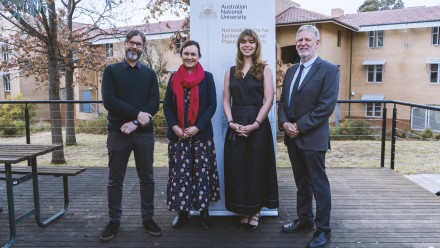
Off the fence: Jasmine Pearson’s journey to postgraduate excellence »
Read about the Centre's history, governance and structure.
Find our contact details.
You are here
Students can undertake a Doctor of Philosophy (PhD) or a Masters of Philosophy (MPhil) through RSPH in research areas of anthropology, biostatistics, demography, epidemiology, sociology, or any combination of these.
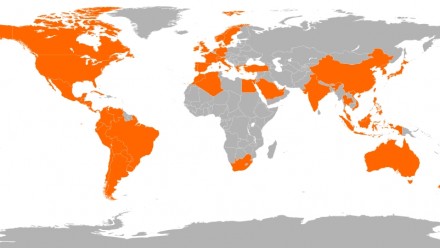
Doctor of Philosophy »
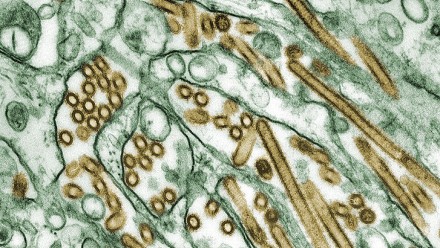
Master of Philosophy »

Master of Philosophy (Applied Epidemiology) »
Find a supervisor ».
Identify a potential supervisor for your research degree.
Summer research »
A Summer Research Scholarship at ANU is an exceptional opportunity for undergraduate students, providing insight into what studying for an Honours or a graduate research degree is all about.
Updated: 3 October 2017 / Responsible Officer: Director / Page Contact: Executive Support Officer

ANU College of Science
The unexpected poetry of phd acknowledgements.

Not many people will read your PhD thesis, but if you completed your doctoral research at the Australian National University College of Science, then Tabitha Carvan has probably read one small part of it.
What she found is a kind of poetry in the science.
This multimedia essay was produced by the ANU College of Science Communications Team:
- Written by Tabitha Carvan
- Editorial assistance: Olivia Congdon
- Illustrations and design: Amanda Cox
- Multimedia: Nic Vevers
- Digital production: Ilario Priori

Embarking on a PhD is a treacherous task for even the most bold and brave of this world, and yet here I sit, writing my way through the final hoops of this life-changing experience.
James Beattie
The statistics of magnetised interstellar turbulence (2024)
For a reason I can no longer remember, I started picking science theses at random from the Australian National University library catalogue and reading only the acknowledgements.

The acknowledgements are my favourite part of all my thesis.
Growth and characterisation of GaAs/AlGaAs core-shell nanowires for optoelectronic device applications (2016)

This part of the thesis is the one that I was most looking forward to write.
Jorin Diemer
A mathematical model of ion homeostasis in the malaria parasite, Plasmodium falciparum (2022)
Once I started, it was very hard to stop.
Sometimes I found myself reading them at home, on my own time, always thinking, 'Just one more.'
If you, the reader, are a PhD candidate, you should know that not everyone’s doctoral experience is the same, but I found mine quite challenging.
An analytic approach to the structure and composition of general learning problems (2021)

I don’t think it’s overstating events to say that at the end of my PhD I find myself a rather different person than when I began (and not only because of the ravages of time).
Elizabeth Krebs
Breeding biology and parental care of the crimson rosella (1999)
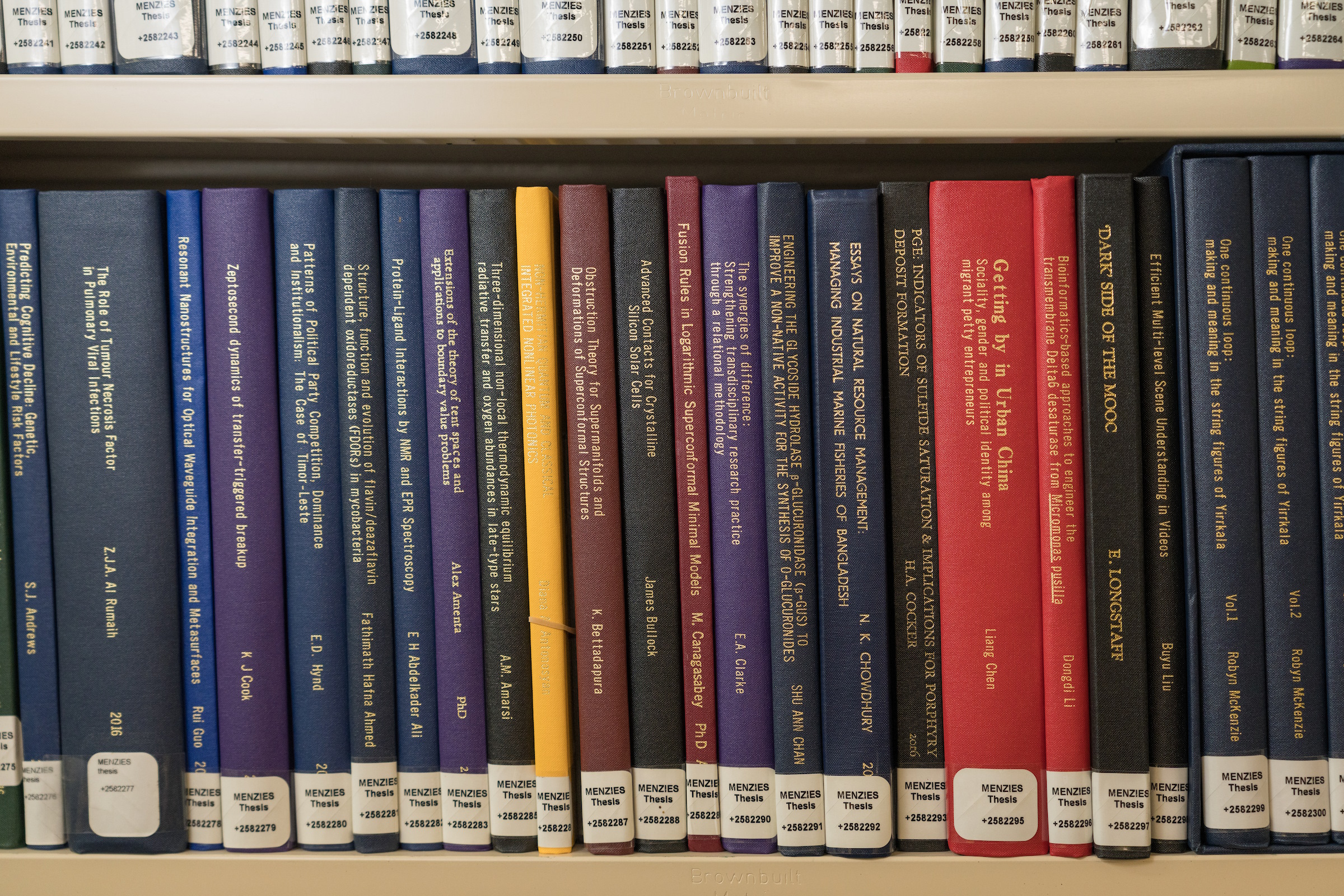
All the acknowledgements followed the same basic structure; they're formulaic. But as with many formulaic things, there's a story behind each one.
I read hundreds and hundreds of acknowledgements.
The production of a dissertation is a formidable, arduous and demoralising task.
Mahyar Bokaeeyan
Analytical and approximate methods in rogue wave theory (2020)
I came to see that the acknowledgements of a PhD thesis are their own kind of thing.
The rest of the thesis contains careful, reasoned findings and figures, but on this one page, the author-scientist can release all the pent-up emotion they couldn’t express elsewhere.
They’re like an explosion in a lab.

When looking at the acknowledgements of others, I have found it is common practice for scholars to reserve their purplest prose and most overblown sentiment for their acknowledgements. If I had the skills, I would do so myself.
Martin Worthy
A history of fire and sediment transport in the Cotter River catchment, southeastern Australia (2013)
I have to laugh as I recall certain fatigue-driven moments of internal melodrama, usually after long and unbroken spells of intense laboratory work, wondering how on earth I was going to singlehandedly manage this project to completion.
Jenna Roberts
A multi-disciplinary assessment of endocrine disrupting chemicals, pharmaceuticals and personal care products in Australia's largest inland sewage treatment plant and the Molonglo/Murrumbidgee effluent-receiving environment (2015)
This thesis is of you, and it belongs to you, as do I.
Superfluid dissipation and feedback cooling in ultracold atomic gases (2024)
Acknowledgements have a quality which is hard to describe.
They feel like they’ve been drafted a hundred times in the head of the author, but then put down on the page in a hurry, the clock ticking on their deadline.
Like, they’re trying to tell you the most important thing they’ve ever said - at the very moment the ship is pulling away from the dock.
Tibor and Jena, Elisa and James, how can I express how much all your love and support has meant to me?
Allie Mokany
Resilience and resistance of ephemeral aquatic ecosystems to environmental change (2006)
Finally I thank you Kat, for being the only thing that really matters.
Jevon Longdell
Quantum information processing in rare Earth ion doped insulators (2003)
The urgency of the task, combined with its enormity, makes it seem almost impossible to complete.

Truly, I could never find the words to thank you for your support. There are so many of them and they catch in my throat even just thinking of them, and make it ache.
Inez Harker-Schuch
Using 3D serious gaming interventions to promote climate science literacy in the 12-13-year age group (2021)
At this point, to describe the thankfulness I want to express only seems to make it seem smaller than it really is, because words can only do so much.
Matthew Crabb
Nonlinear wave patterns in the complex KdV and nonlinear Schrodinger equations (2022)
Many people find themselves lost for words at this critical moment.
It’s frustrating for scientists to not be able to accurately represent their data.

For all that Tim has done to shape me into the person and the scientist that I am today, ‘thank you’ seems so embarrassingly simple and utterly inadequate to convey the depth of my gratitude to him. I truly hope I have done him proud.
Ponlawat Tayati
Molecular wet adhesion (2015)
I cannot begin to describe their level of kindness and generosity for which they – being the good souls they are – have expected nothing in return.
Synthesis and coordination chemistry of the arsacyclopentadiene ligand (2023)
In some ways, this section of my thesis is the hardest to write, and also the most important.
Sandra Ann Binning
The effects of biotic and abiotic factors on fish swimming performance (2014)
But even an English literature student would surely struggle with this writing project.
Within this generic format, you need to deliver an outpouring of love and gratitude on the scale of a wedding vow.
And then throw in the inside jokes of a 21st birthday speech, the teary-eyed reflections of a eulogy, and the celebration of a birth announcement.
It takes a village to raise a child and this PhD is as close to bearing a child as I’ll likely ever come.
Rachael Gross
At a crossroads: African elephant conservation, climate change and community-based management (2023)
He has had to live with me and the emotions that go with a PhD and has stood steadfastly by me encouraging me to the bitter end, though I’m sure he would like to know just when the demonic banshee moved in and I checked out.
Trudi Wharton
Biology and ecology of Essigella californica (Essig) on Pinus radiata D.Don. in Australia (2005)
There are many people who come in and out of your life and who make a difference. There are deaths and births; there is despair and joy.
Jennifer Metcalfe
Rethinking science communication models in practice (2019)
Thanks also to Moira, Zoë and Brad for tolerating my existence.
Michael Duglosch
Cross-coupling chemistry as a tool for the synthesis of diverse heterocyclic systems and natural products (2019)
Tom, few supervisors can say that their students have nearly killed them and mean it literally. Thanks for everything.
Iain McConnell
Substrate interactions in the Photosystem II water oxidising complex (2008)
- First quote
- Second quote
- Third quote
- Fourth quote
- Fifth quote

But in this, the most unscientific part of a PhD submission, you also see how the science is done.
No matter how impenetrable the thesis title, the project’s success always seems to come down to the same simple thing: other people.

Thank you to those individuals who donated their own teeth to my study, and to the late great Professor Colin Groves, who eagerly donated a dugong tooth for a laser ablation Sr standard, and then eagerly donated a second one when the first one went missing.
Hannah James
Adventures in archaeological science: an exploration of oxygen and strontium isotopic variability on a micro- to macro-scale (2021)

To Banak Gamui, I thank him for purchasing a roll of fishing line and a pair of gloves for the parrot project, and for which I never paid his money back.
The conservation of large rainforest parrots: a study of the breeding biology of palm cockatoos, eclectus parrots and vulturina parrots (2002)
These are advanced research projects, using high-tech equipment and sophisticated analysis, and yet the thing which is acknowledged, again and again, as if it’s of equal, if not greater, importance is conversation.
Just, you know, talking.
I would like to thank Dick Henley for his unrelenting enthusiasm for volcanoes and magmatic gases.
Dominique Tanner
In situ mineral geochemistry as a guide to ore-forming processes (2014)
I am thankful for Jim’s patience (especially with my typos), his discussions, his time, and his open-mindedness to my sometimes unusual ideas.
Larissa Huston
The high pressure phase transformations of silicon and germanium at the nanoscale (2019)
Laurence was very supportive about my interest in thrips even before I had a thrips project, and I will never forget some of the conversations we had in his office.
Brian Garms
Native insects as a framework for understanding potential impacts of exotic species (2014)
Thanks for letting me barge into your office whenever I came across problems with the micro-PL system and simply answering ‘I’ll be right there.’
Growth and characterisation of GaAs/AlGaAs core-shell nanowires for optoelectronic device dpplications (2016)
Thank you for patiently listening to my long conversations on Sonogashira reactions and sharing my frustrations when I couldn’t grow crystals.
Chriso Maria Thomas
Construction of porous supramolecular frameworks assembled from covalent cage compounds (2021)
Sometimes just having someone to listen to me when my research was at a stumbling block was all that was needed to find a solution, and I thank David for his patience and time in this regard.
Janet Pritchard
Linking fish growth and climate across modern space and through evolutionary time: otolith chronologies of the Australian freshwater fish, golden perch (Macquaria, ambigua, Percichthyidae) (2004)
Thank you to the friends who simply knew not to ask.
Sarah Tynan
Interpreting environmental change using bivalve shell geochemistry (2017)
- Sixth quote
- Seventh quote
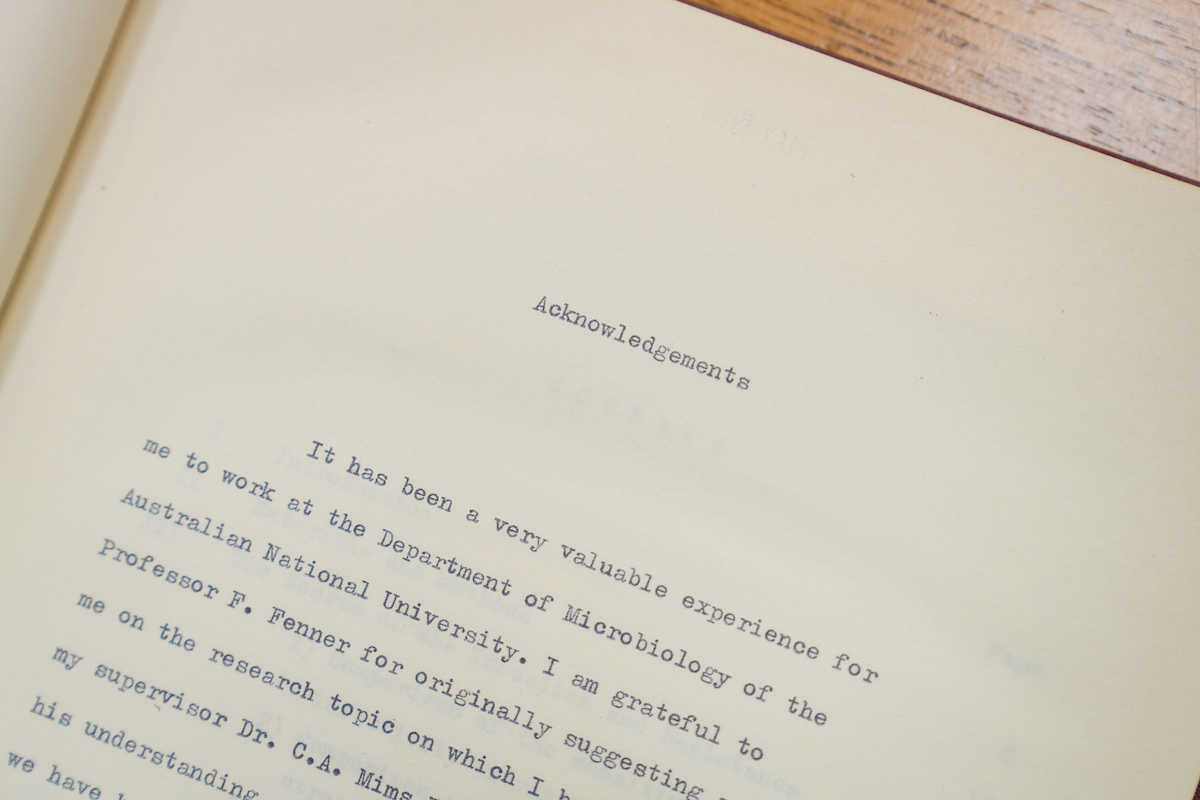
After a while, I stopped dipping into the theses from before the 1980s.
Back then, acknowledgements were a business-like thank you to supervisors, collaborators, funding bodies, and typists.
Still, I’m sure there are stories in there too.
I wish to thank Professor J .C. Eccles for acting as supervisor of this research.
Rosamond Eccles
Physiological and pharmacological investigations on synaptic transmission in sympathetic ganglia (1955)

Finally, I thank Mrs Barbara Geary, both for her excellent typing and also for her willingness to accept, and ability to decipher, the manuscript drafts of the thesis.
John Groves
Varieties of soluble groups (1971)
Mrs Barbara Geary for her work in typing this thesis.
Yu Kiang Leong
The CREAM Conjecture and certain abelian-by-nilpotent varieties (1972)
For her excellent typing I thank Barbara Geary.
Langdon Harris
Varieties and section closed classes of groups (1973)
I particularly want to thank Mrs Barbara Geary for her excellent typing of this thesis. She has endured many awkward changes and revisions without complaint, and has transformed my messy drafts and redrafts into a beautifully typed manuscript.
Abul Kasem Muhammad Masood-ul-Alam
The topology of asymptotically Euclidean static perfect fluid space-time (1985)
Now, there are no limits to who, or what, you can thank.

Finally I wish to acknowledge the work of Dave Grohl who provided a fine soundtrack for much of this PhD study.
Andrew Sullivan
Competitive thermokinetics and non-linear bushfire behaviour (2007)

I would also like to thank the various astronomers who forgot to collect their desserts from the fridge over the years (they were not wasted).
Roberto Soria
Accretion processes in black-hole binaries (1999)

Thanks to my dog Tonks for the joy and cuddles.
Catherine Ross
Bringing back the bettong: reintroducing ecosystem engineers for restoration in Box-Gum grassy woodland (2020)

Shout out to my friends on and off Stromlo, for their patrician taste in hot pot and KFC.
Galactic Archaeology: the Milky Way in the context of large scale surveys (2022)
One of the most-repeated phrases in the acknowledgements is:
“I could not have done it without you”.
Every time I read it, I believed it to be 100 percent true.

Finally, thank you so much to my amazing family for their love, especially my wife, Maansi Joshi. You are my shining light, my daily inspiration and I could not have done this without you.
Geoffrey Kay
Scaling the benefits of agri-environment schemes for biodiversity conservation in agricultural landscapes (2016)
Finally, to Mum, your courage is inspiring. You may think I am the rock in the family, but I could not have finished my PhD without you.
Samuel Drew
Explorations in polyene chemistry (2015)
And finally to my beautiful wife, Jing, I could not have done this without you and I cannot wait to spend the rest of my life with you.
Roger Coulston
Cyclodextrin nanomachines at work (2009)
A PhD takes at least three years, and often many more, during which life necessarily goes on around you, or without you.
The cost is very real.
If you are in the lab, then you are not at home with your family. If you have relocated for your studies, you won’t be having home-cooked meals.

Six years is a long time.
Philip Palma
Laser-induced fluorescence imaging in free-piston shock tunnels (1999)
As their only child, my parents never stopped me from pursuing my dream. They unconditionally supported me to continue my study in Australia. Even if it means that I have to be thousands of miles away from them.
III-V compound semiconductor nanowire terahertz detectors (2016)
And thank you for picking up the slack with house chores whenever I was bogged down with lab work – I know I was the reason you bought that Roomba.
Lauren Harrison
Sex and conflict: How competition shapes reproduction, behaviour and life-histories in various animals (2022)
And sometimes, life will simply come at you, whether you want it to or not.

First, I want to acknowledge that the last year of my PhD, 2020, has been exceptionally hard for everyone. I am incredibly grateful for being safe and healthy.
Raktima Dey
Understanding historical and future changes in mean and extreme rainfall in Australia (2020)
I am grateful to all the persons who have helped me recover from the fire that devastated the observatory and destroyed my house at Mount Stromlo (at a very delicate moment of my thesis too...). I will remember everyone who shared those days with me, so full of tragedy but also of hope and all the best human feelings.
Maria Salvo
How good are type Ia supernovae as distance indicators? (2020)
Finally, to our baby, ‘Bubbles’, whose gentle kicks have reminded me I haven't been alone in the final months of this thesis. But, Bubbles, if you can just sit tight for a few more weeks so that Mum and Dad can have a rest we'd be very grateful.
Kelli Gowland
Investigations into the phorophyte and fungal relationships of three epiphytic Aeridinae orchid species in southeastern Australia (2008)
I’m sure there are detractors behind many a thesis, but in the acknowledgements, they only exist by omission.
And if the whole experience was an ordeal? Thankfully that’s now in the past.
Here, on this page, it’s a perfect world.
There’s no-one to blame and everyone to thank – including baristas.
Mum, you once told me I could do whatever I set my mind to, I told you that was a cliché, and you said, ‘Yeah but for you it’s actually true.’ Well here you go, look at the trouble that attitude has led to.
Thomas Loan
Cell lysate as a platform technology for biocatalytic synthesis and nucleic acid amplification (2020)
And of course to my parents, Andrew and Margaret; my foundation, my teachers, my wings.
David Blair
Comparisons of vegetation recovery post-fire, logging and salvage logging in the Victorian Central Highlands (2019)
Finally, to my parents: this may have all started when we visited the Sydney Observatory one birthday and saw the marks of Shoemaker-Levy 9 just spinning into view on the disk of Jupiter, but it was your love and support all these years since that made it possible.
Michele Bannister
Bright trans-Neptunian objects in the southern sky (2014)
This thesis happened because my family and good friends believe in me.
Jo Leen Lim
Protein engineering of Escherichia coli β-glucuronidase (2017)
Doing this thesis required considerable amounts of coffee. I want to recognise Luke, our Barista in the Little Pickle Café, for the excellent coffee and the funny attempts to learn Spanish.
Claudia Munera Roldan
Narratives of adaptation for future-oriented conservation (2017)
I thank my mother, Dr K. Lalitha for being the person I aspire to be. I wish I could be half person you were. Words can’t express how much I miss you…
Mayuri Sathyanarayana Rao
On the detection of spectral distortions in the CMB: recombination to reionisation (2017)

Why wouldn’t you want to read ‘just one more’?

You are all precious like stardust.
Dominik Koll
A 10-million year time profile of interstellar influx to Earth mapped through supernova Fe-60 and r-process Pu-244 (2023)
Who wouldn’t want to extend their time in such a world just a little bit longer?
This small family, including our cats, Molly and Jesse, is my true treasure.
Light-matter interaction models: symmetry and non-hermiticity (2023)
And to Louise, thank you for everything. I don't know how you do it.
James Hennessy
Modifying enzyme catalytic pathways (2009)
I wondered how many of these acknowledged loves endured, not to mention how many scientific or academic careers.
But for now, on that page, the author knows nothing of what the future will hold.
So long and thanks for all the coffee!
Samantha Burgess
Geochemical ecology of temperate corals (2007)
They are frozen in this moment in time between an ending and a beginning.
YES!! After a looooooong journey, I've finally done it! YES!!
Yi-chi (Candace) Tsai
Oxidative behaviour of O-methyltyrosine and p-methoxyphenylglycine derivatives (2007)
It is the best moment.

It seemed as though the day that I would type these acknowledgements would never come.
Amy Constable
The emergence, formalisation and evolution of biodiversity offset use in Australia (2022)
But at this point, looking back over the mountains you climbed and the valleys you crossed, you realise your motivation came from the people around you. That is why we have an acknowledgements section.
Liam D Bailey
Between the devil and the deep blue sea: consequences of extreme climatic events in the Eurasian oystercatcher (Haematopus ostralegus) (2016)
It’s the moment when it’s done.
I am overwhelmed. I have finally completed this milestone, three and a half years of my life culminating in this body of work.
Andrew Shafik
5-methylcytidine has a complex, context-dependent role in RNA (2017)
It will take me the rest of my life to repay you for your patience, support, encouragement, dedication, and sacrifice.
Richard Turner
Avian life histories in a changing world: combining remote sensing with long-term monitoring of the superb fairy-wren Malurus cyaneus in Australia (2023)
Thank you, again and again.
Yi-Yang Chen
The nature and significance of 'macroalgae-epifauna-invertivorous fish' trophic links within a macroalgal-dominated reef ecosystem (2022)
John Dawson
Satellite radar interferometry with application to the observation of surface deformation in Australia (2008)

Doctor of Philosophy (PhD)
During the PhD program you will work with increased independence, under the direction of a supervisory panel of experts in the field. Your research will make an original and important contribution to human knowledge, research and development.
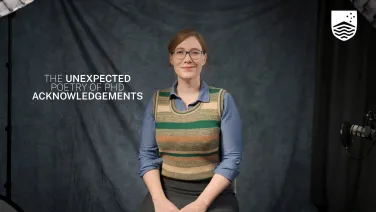
Scientists react to their PhD acknowledgements
We asked scientists to revisit their PhD acknowledgements. Watch the video as they reflect on that momentous time in their lives.

The best words in the best order: why do our astronomy students burn their PhD thesis?
The tradition of burning their PhD thesis has been handed down from student to student at Mount Stromlo ever since the 2003 bushfires.
Subscribe to receive our best science stories every month
- Dean's welcome
- Our history & achievements
- Reconciliation Action Plan
- ANU Joint Colleges Partnerships with Indigenous Organisations & Communities Fund
- Indigenous Professional Staff Traineeship Program
- Research & innovation
- Advancement office
- Business Development
- Human Resources
- International Relations and Partnerships
- Marketing and Communications
- Research Management
- Student Services
- International Relations & Partnerships
- Award winners
- Grants & fellowships
- I.D.E.A events
- I.D.E.A. resources
- Academic career support
- Staff guide on moving to Australia
- Bachelor degrees
- Vertical Double Degree Pathways
- Master degrees
- Graduate certificates
- Joint & Dual Award PhD programs
- Summer Research program
- How to apply
- Commonwealth Supported Places
- Future Research Talent Travel Awards (India)
- Future Research Talent Awards (Indonesia)
- Sustainable agriculture top-up scholarship
- The Biosocial Shaping of Conservation and Biodiversity in Australia's Capital
- Dean’s Science Education Commendation Award
- Dean's International Science Excellence Scholarship
- Director’s Scholarship for Academic Excellence
- ANU Chancellor's International Scholarship
- External scholarships & sponsorships
- International students
- Careers & opportunities
- Course guides
- Interview Your Future Self
- Field trips
- Global learning
- Student stories
- 360 Virtual tours
- Our research
- Field sites
- Research stories
- Academic profiles
- Research projects
- Research schools
- Institutes & centres
- ANU Science on Location
- Hosting an intern
- Schools outreach
- 2024 STEM Challenges
- STEM Boxes 2024 (Domestic)
- STEM Boxes 2024 (International)
- The National STEM Communicators Challenge: Hidden Mathematics at Work
- Indigenous engagement
- Science Lab: Experiments for home & school
- Science Case Study Competition 2024
- Australian Bee Observation Network
- Student blog
- STEM Guest Lecture Series
- Current student enquiries
- Book an appointment
- Ask a question
- Online drop-in sessions
- Future student enquiries
- Current students
- Alumni events
- Alumni news
- Mentoring & volunteering
- As You See It! Public voting
- As You See It! winners
- Programs and Courses

Master of Statistics
A single two year graduate award offered by the ANU College of Business and Economics
- Length 2 year full-time
- Minimum 96 Units
- Academic plan MSTAT
- Post Nominal
- CRICOS code 082353G
- 830280 (M Statistics)
- AsPr Robert Clark
- Admission & Fees
- First Year Advice
- Introduction
Career Options
Learning outcomes, inherent requirements, further information.
- Additional Information
Admission Requirements
Scholarships.
- Indicative Fees
Program Requirements
Study options.
The Master of Statistics requires the completion of 96 units, which must consist of:
48 units from completion of the following compulsory courses:
STAT6038 Regression Modelling
STAT6039 Principles of Mathematical Statistics
STAT7004 Introduction to Stochastic Processes
STAT7016 Introduction to Bayesian Data Analysis
STAT7026 Graphical Data Analysis
STAT7030 Generalised Linear Models
STAT7040 Statistical Learning
STAT8027 Statistical Inference
A minimum of 24 units from completion of courses from the following list:
STAT7006 Advanced Stochastic Processes
STAT7017 Big Data Statistics
STAT7018 Stochastic Modelling
STAT7029 Design of Experiments and Surveys
STAT7042 Survival Models
STAT7050 Advanced Statistical Learning
STAT8002 Applied Time Series Analysis
STAT8003 Biostatistics
STAT8056 Advanced Mathematical Statistics
A maximum of 24 units from completion of the following courses:
COMP6240 Relational Databases
COMP6261 Information Theory
COMP6420 Introduction to Data Management, Analysis and Security
COMP6490 Document Analysis
COMP6670 Introduction to Machine Learning
COMP6710 Structured Programming
COMP6730 Programming for Scientists
COMP8410 Data Mining
COMP8420 Neural Networks, Deep Learning and Bio-inspired Computing
COMP8430 Data Wrangling
COMP8600 Statistical Machine Learning
COMP8880 Computational Methods for Network Science
ECON8013 Optimisation for Economics and Financial Economics
EMET8001 Applied micro-econometrics
EMET8005 Econometric Methods and Modelling
EMET8008 Advanced Econometrics II
EMET8012 Business and Economic Forecasting
EMET8014 Advanced Econometrics I
MATH6005 Discrete Mathematical Models
MATH6100 Bioinformatics and Biological Modelling
MATH6102 Environmental Modelling and Integrated Assessment
MATH6109 Probability Modelling with Applications
MATH6110 Analysis 1: Metric spaces and Applications
MATH6111 Scientific Computing
MATH6112 Matrix Computations
MATH6115 Mathematical Finance
MATH6119 Numerical Optimisation
MATH6208 Advanced Mathematical Bioinformatics
MATH6212 Analysis 2: Topology, Lebesgue Integration and Hilbert Spaces
POPH8100 Fundamentals of Epidemiology
POPH8101 Biostatistics in Population Health
POPH8313 Analysis of Public Health Data
STAT6043 Life Contingencies
STAT6046 Financial Mathematics
STAT8053 Research Essay in Statistics
STAT8057 Risk Modelling 1
STAT8058 Risk Modelling 2
STAT8500 RSFAS Masters Thesis
CBEA6070 ANU College of Business and Economics Internship Project
| Year 1 48 units | Regression Modelling 6 units | Principles of Mathematical Statistics 6 units | Course from the elective list | Course from the elective list |
| Generalised Linear Models 6 units | Graphical Data Analysis 6 units | Introduction to Bayesian Data Analysis 6 units | Introduction to Stochastic Processes 6 units | |
| Year 2 48 units | Statistical Learning 6 units | Statistical Inference 6 units | A course from , , /8003, | A course from , , /8003, , |
| A course from , , , | A course from , , , | Course from the elective list | Course from the elective list |
At a minimum, all applicants must meet program-specific academic/non-academic requirements, and English language requirements. Admission to most ANU programs is on a competitive basis. Therefore, meeting all admission requirements does not automatically guarantee entry.
Applicants must present a Bachelor degree or international equivalent with a minimum GPA of 5.0/7.0, with at least one course in the field of mathematics that must cover calculus and linear algebra.
Applicants with an ANU Graduate Certificate of Finance and Actuarial Statistics (Statistics specialisation) with a GPA of 4.5, with at least one course in the field of mathematics from university studies that must cover calculus and linear algebra.
In line with the university's admissions policy and strategic plan, an assessment for admission may include competitively ranking applicants on the basis of specific academic achievement, English language proficiency and diversity factors.
Academic achievement & English language proficiency
The minimum academic requirement for full entry and enrolment is a Bachelor degree or international equivalent with a minimum GPA of 5.0/7.0 or 4.5/7.0 (as applicable).
However, applicants will first be ranked on a GPA ('GPA1') that is calculated using all but the last semester (or equivalent) of the Bachelor degree used for admission purposes.
If required, ranking may further be confirmed on the basis of:
• a GPA ('GPA2') calculated on the penultimate and antepenultimate semesters (or equivalent) of the Bachelor degree used for admission purposes; and/or
• demonstrating higher-level English language proficiency.
Prior to enrolment in this ANU program, all students who gain entry will have their Bachelor degree reassessed, to confirm minimum requirements were met.
Further information: English Language Requirements for Admission
Diversity factors
As Australia’s national university, ANU is global representative of Australian research and education. ANU endeavours to recruit and maintain a diverse and deliberate student cohort representative not only of Australia, but the world. In order to achieve these outcomes, competitive ranking of applicants may be adjusted to ensure access to ANU is a reality for brilliant students from countries across the globe.
Assessment of qualifications
Unless otherwise indicated, ANU will accept all Australian Qualifications Framework (AQF) qualifications or international equivalents that meet or exceed the published admission requirements of our programs, provided all other admission requirements are also met.
Where an applicant has more than one completed tertiary qualification, ANU will base assessment on the qualification that best meets the admission requirements for the program. Find out more about the Australian Qualifications Framework: www.aqf.edu.au
ANU uses a 7-point Grade Point Average (GPA) scale. All qualifications submitted for admission at ANU will be converted to this common scale, which will determine if an applicant meets our published admission requirements. Find out more about how a 7-point GPA is calculated for Australian universities: www.uac.edu.au/future-applicants/admission-criteria/tertiary-qualifications
Unless otherwise indicated, where an applicant has more than one completed tertiary qualification, ANU will calculate the GPA for each qualification separately. ANU will base assessment on the best GPA of all completed tertiary qualifications of the same level or higher.
Applications for course credit
Applicants with a Bachelor Degree or Graduate Certificate in a cognate discipline may be eligible for 24 units (one semester) of credit.
Applicants with a Graduate Diploma or Honours in a cognate discipline may be eligible for 48 units (one year) of credit.
Indicative fees
For more information see: http://www.anu.edu.au/students/program-administration/costs-fees
For further information on International Tuition Fees see: https://www.anu.edu.au/students/program-administration/fees-payments/international-tuition-fees
Fee Information
All students are required to pay the Services and amenities fee (SA Fee)
The annual indicative fee provides an estimate of the program tuition fees for international students and domestic students (where applicable). The annual indicative fee for a program is based on the standard full-time enrolment load of 48 units per year (unless the program duration is less than 48 units). Fees for courses vary by discipline meaning that the fees for a program can vary depending on the courses selected. Course fees are reviewed on an annual basis and typically will increase from year to year. The tuition fees payable are dependent on the year of commencement and the courses selected and are subject to increase during the period of study.
For further information on Fees and Payment please see: https://www.anu.edu.au/students/program-administration/fees-payments
ANU offers a wide range of scholarships to students to assist with the cost of their studies.
Eligibility to apply for ANU scholarships varies depending on the specifics of the scholarship and can be categorised by the type of student you are. Specific scholarship application process information is included in the relevant scholarship listing.
For further information see the Scholarships website.
In disciplines as diverse as biology, economics, actuarial studies, psychology, physics, archaeology, medicine and information technology, there is always a need for qualified statisticians to make proper sense of the data. The Master of Statistics program will enable you to specialise in any of a large number of areas, as well as receive rigorous training in core statistical application and theory. This will set you up as a professional statistician whose services will be highly sought-after. With an ANU Master of Statistics you will excel in your career literally anywhere in the world.
ANU ranks among the world's very finest universities. Our nearly 100,000 alumni include political, business, government, and academic leaders around the world.
We have graduated remarkable people from every part of our continent, our region and all walks of life.
- Demonstrate statistical computing skills for use in quantitative and data-based problem solving.
- Understand and be able to apply the processes and applications of: multiple linear regression, survey design; mathematical statistics, stochastic modelling, generalised linear modelling techniques; the principles of data representation, summarisation and presentation; multivariate statistical techniques; and, the role and notion of both parametric and non-parametric statistics.
- Analyse complex problems by running and interpreting time series models involving dynamic volatility and/or trends.
- Analyse and interpret data in various contexts using appropriate methodology.
- Work independently and collaboratively to collect, process, interpret and communicate the outcomes of fundamental research questions in applied statistics.
Information on inherent requirements is currently not available for this program
For Domestic Students applying through UAC: If you have completed an overseas qualification, please send a scanned copy of your original testamur (graduation certificate) and academic transcript through to [email protected]. The scanned documents should be in colour and unaltered in size. Please include your name and UAC number in the email.
Students in the Master of Statistics program have the option of applying to undertake a Statistics Masters thesis as a possible pathway to PhD study. Details regarding the Masters thesis are below:
· Length : 24 units, to be completed in the final year of the Master of Statistics
· Eligibility : To be eligible to apply, students must have achieved a GPA of at least 6.5 across prior coursework within the Master of Statistics. Eligibility will also depend on the compulsory courses that students are required to still complete as part of their Masters degree, and specifically whether students have sufficient space in their program.
· How to apply : Students’ must write a case as to why they want to engage in the course and must have already secured a supervisor
· Courses the thesis replaces : The courses that the thesis replaces will be determined in consultation with the Statistics Masters convenor and will depend on the background of each student.
Students who are accepted into the Masters thesis component should contact Robert Clark ( [email protected]) to confirm their study plan for the program. Please note that undertaking a Masters thesis does not guarantee entry to a PhD.
Enrolment Status
Academic advice.
Back to the Master of Statistics page
It is possible to enrol in less than 24 units per semester but it will take you longer to finish your program and get your degree. If you are an international student you must always be enrolled full-time in 24 units each semester.
- Full Study Plans
- CBE Fast Track
- Credit Procedures
Responsible Officer: Registrar, Student Administration / Page Contact: Website Administrator / Frequently Asked Questions
- Contact ANU
- Freedom of Information
+61 2 6125 5111 The Australian National University, Canberra CRICOS Provider : 00120C ABN : 52 234 063 906


IMAGES
VIDEO
COMMENTS
The PhD program in Statistics at the Research School of Finance, Actuarial Studies and Statistics (RSFAS) equips graduates with knowledge of developments in theoretical and applied statistics. The PhD program draws upon the diverse expertise of academic staff across the University. ... one or two statistics academics at ANU who conduct research ...
Recent Statistics PhD Alumni. Emma Ai - PhD Awarded: 2020. Thesis: Numerical solutions of SPDEs with boundary noise. Yang Yang - PhD Awarded: 2020. Thesis: Modeling and forecasting functional time series. Lingyu He - PhD Awarded: 2020. Thesis: Data-adaptive Principal Component Analysis for High Dimensional Data.
ANU Research School of Finance,Actuarial Studies and Statistics. We offer an extensive suite of rigorous undergraduate and postgraduate coursework and research degrees in all three fields. We are a young and dynamic school and our faculty have received PhDs from the world's very best universities. Our unique combination of finance, actuarial ...
Statistics PhD students; Breadcrumb. RSFAS; Academic Areas; Statistics; Statistics faculty ... Associate Professor in Statistics. Director - ANU Postgraduate Studies. Professor Andrew Wood. Professor. Associate Professor Yanrong Yang. Associate Professor. Dr Tao Zou. Senior Lecturer. Le Chang.
A combination of qualifications, research publications and/or professional experience related to your field of study. Requirements for admission to a Master of Philosophy degree. An Australian bachelor's degree or higher, with an overall grade of distinction or higher, or the international equivalent, or. Another equivalent degree, or.
The PhD program in Statistics at the Research School of Finance, Actuarial Studies and Statistics (RSFAS) at Australian National University equips graduates with knowledge of developments in theoretical and applied statistics. Australian National University. Canberra , Australian Capital Territory , Australia. Top 0.5% worldwide.
Statistics. The Statistics Research Group within the Research School of Finance, Actuarial Studies and Statistics (RSFAS) brings together staff with a diverse range of interests and research agendas ranging from probability theory to applications of statistics. Our staff collaborate with researchers throughout the University and elsewhere ...
Doctor of Philosophy (PhD) Statistics. Master of Philosophy (MPhil) Doctor of Philosophy (PhD) Find out more about your pathway. Read more about your pathway to studying with the ANU College of Business and Economics, including how to apply, scholarships and other opportunities available to you.
A PhD in Demography at the ANU offers postgraduate research training which brings together this expertise to inform a new generation of researchers, policy makers and business leaders. ... quantitative sociology, statistics, public health or economics) from an approved university, with results that the convenor deems to be at least equivalent ...
Actuarial Studies PhD students; Recent journal articles; Finance. Finance faculty; Finance PhD placements; Finance PhD students; Recent journal articles; Statistics. Statistics faculty; Recent journal articles; Statistics PhD students
PhD in Finance. The PhD program in Finance at the Research School of Finance, Actuarial Studies and Statistics (RSFAS) equips graduates with the necessary skills to conduct research in the field of finance. The program will challenge PhD candidates to identify and solve important questions in the finance world, and will help them to develop a ...
Through the MPhil program in Statistics at the Research School of Finance, Actuarial Studies and Statistics (RSFAS), candidates will receive rigorous training in core statistical application and theory, enabling them to choose a specialisation from a wide variety of areas. The program is focused on developing candidates for a career in ...
The Graduate Certificate of Finance and Actuarial Statistics is designed for students who wish to: Develop a greater understanding of financial, actuarial or statistical principles and their application; Gain Part II exemption status for the Institute of Actuaries; Improve analytical skills for interpreting and analysing financial, actuarial or ...
ANU PhD Scholarships, applications can be made throughout the year; The Mathematical Sciences Institute also offers supplementary scholarships to attract talented Australian and New Zealand students of high calibre to pursue postgraduate research within the MSI. The scholarship provides for payment of a supplementary stipend to an outstanding ...
Yizhi (Jeremy) Wang . Shandong University of Science and Technology, 2020. Isaac Pan . University of Sydney, Lecturer in Finance, 2019. Philip Drummond . Monash University, Lecturer in Finance, 2018
The Statistics specialisation is designed for students who wish to: Develop a greater understanding of statistical principles and their application; Improve analytical skills for interpreting and analysing statistical information; Gain greater insight into the Australian and international financial markets; >Increase management skills for dealing with organisations, teams and policy issues ...
We have a wide range of potential research topics. They range from short-term PhB projects to year-long honours and graduate projects to three-year PhD projects. This repository shows a sample of science, health and medicine research at ANU. Visit our research school websites for more detail. The Australian National University acknowledges ...
The PhD program in Actuarial Studies at the Research School of Finance, Actuarial Studies and Statistics (RSFAS) equips graduates with the necessary skills to undertake independent research and develop knowledge and expertise in a specialised research topic within the field of actuarial studies. The program is focused on developing candidates ...
Graduate research programs. The ANU College of Business and Economics (CBE) conducts world-class research. The College's academic staff collaborate on research projects with other academic institutions, industry and government. They are at the forefront of global thinking on issues relating to wealth and wellbeing, strong organisations ...
We are seeking domestic PhD applicants with advanced skills in mathematical statistics, infectious disease modelling, or spatial modelling to contribute to an ARC Linkage funded project "Surveillance programs and sampling schemes for assessing and maintaining the absence of pests and diseases".We intend to fund two PhD projects in the following areas:Mathematical modelling of diseases at ...
A Doctor of Philosophy (PhD) is an intensive research degree that normally takes between two and four years of full-time study (or equivalent) to complete. ... A Summer Research Scholarship at ANU is an exceptional opportunity for undergraduate students, providing insight into what studying for an Honours or a graduate research degree is all ...
A single one year graduate award offered by the ANU College of Business and Economics. MSDA. Academic Year 2024 . 2025; 2024; Apply Enquire Now. Length 1 year full-time; ... Applicants with an ANU Graduate Certificate (with four Statistics/Mathematics courses) with a GPA of 4.0/7.0, with at least one course in the field of mathematics from ...
Embarking on a PhD is a treacherous task for even the most bold and brave of this world, and yet here I sit, writing my way through the final hoops of this life-changing experience. James Beattie. The statistics of magnetised interstellar turbulence (2024)
Master of Statistics. A single two year graduate award offered by the ANU College of Business and Economics. There's about enrolling in your degree. At a minimum, all applicants must meet program-specific academic/non-academic requirements, and English language requirements. Admission to most ANU programs is on a competitive basis.